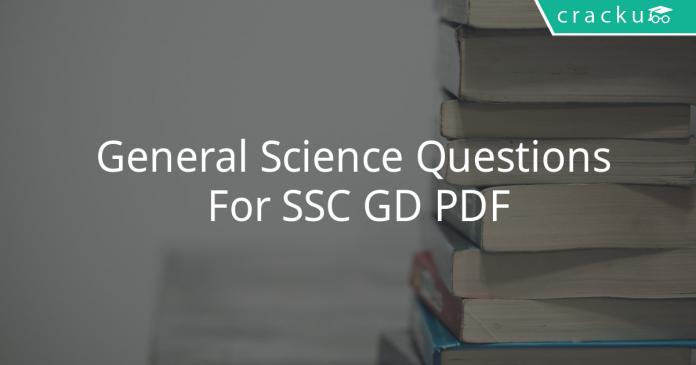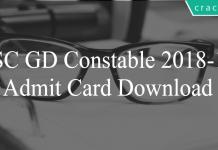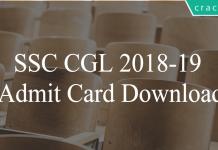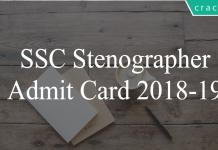General Science Questions For SSC GD PDF
SSC GD Constable General Science Question and Answers download PDF based on previous year question paper of SSC GD exam. 40 Very important General Science questions for GD Constable.
GENERAL SCIENCE QUESTIONS FOR SSC GD PDF
GET 20 SSC GD MOCK FOR JUST RS. 117
Question 1: The Chairman of the National Disaster Management Authority (NDMA), is
a) National Security Advisor
b) Prime Minster of India
c) Chief of DRDO
d) Home Minster of India
e) Director General of CISF
Question 2: Which of the following is correct about the 53rd general Assembly?
It took place in the September 98
India appealed for an universal Prohibition on nuclear Weapons
Pakistan raised the Kashmir issue
a) 1 only
b) 2 only
c) 3 only
d) All are correct
e) None of these
Question 3: Inflation exists when
a) there is general increase in the prices over time.
b) there are periodic decreases in the price level.
c) there are continuous increases in the output level over time.
d) there is rise in the purchasing value of money.
Question 4: Who generally presents the Finance Budget in Indian Parliament?
a) RBI Governor
b) Budget Minister
c) Finance Minister
d) Finance Secretary
Question 5: Who has become the new solicitor general of India?
a) Ranjit Kumar
b) Simran Kaur
c) Ashok Raju
d) M.S Pandey
e) None of these
Question 6: Who has been appointed as the Attorney General of India on 30-June-2017 ?
a) Dr Rajiv Kumar
b) Ranjit Kumar
c) Tushar Mehtha
d) K K Venugopal
Question 7: Oath of office is administered to the President of India by which of the following Persons?
a) Attorney General of India
b) Speaker of Rajya Sabha
c) Vice – President of India
d) Chief Justice of India
Question 8: Who was the Last Governor- General of India?
a) C Rajagopalachari
b) Lord Mount Batten
c) Dr Rajendra Prasad
d) S Radhakrishnan
Question 9: Who among the following is the Chief Legal Advisor to the Government of India?
a) Chief Justice of India
b) Attorney General of India
c) Chief Justice of Delhi High Court
d) Solicitor General of India
Question 10: The Widow Re-Marriage Act was passed by which of the following Governor Generals?
a) Lord Ellenborough
b) Lord Dalhousie
c) Lord Minto
d) Lord Auckland
DOWNLOAD APP TO ACESS DIRECTLY ON MOBILE
Question 11: Who has assumed charge as the new General Manager of Southern Railways, India in November 2017?
a) R K Kulshrestha
b) Dinesh Srivastava
c) G Kalyana Krishnan
d) Neelam Kapur
Question 12: Which of the following Governor Generals of British India has abolished the Practice of Sati through Regulation XVII of 1829 declaring it Illegal?
a) George Barl
b) Lord Hastings
c) Lord William Bentinck
d) Lord Auckland
Question 13: Who is the Secretary General of National Human Rights Commission as on February 2018?
a) Rajesh Kishore
b) H L Dattu
c) Ambuj Sharma
d) Amitabh Kant
Question 14: Emulsion is a mixture which of the following that are generally immiscible ?
a) Gas in a Liquid
b) Solid in a Liquid
c) Liquid in a Liquid
d) Solid in a Solid
Question 15: The type of money market instrument which are high yield grade bonds that generally carry a lower credit rating are called?
a) Masala Bond
b) Green Bond
c) Government Bond
d) Junk Bond
e) Callable Bond
FREE SSC PRACTICE SET (DAILY TEST)
Question 16: Who among the following is the current registrar general and census commissioner of India?
a) C Chandra Mouli
b) Sailesh
c) Anil Sant
d) Ajay Tyagi
e) Bipin Puri
Question 17: Who among the following is the current Director General of World Trade Organization headquartered at Geneva Switzerland?
a) Werner Hoyer
b) Robert Azevedo
c) Audrey Azouley
d) Jin Liqun
e) Takehiko Nakao
Question 18: The Attorney General of India is the ______ of the Government of India.
a) Chief Account Officer
b) Chief Law Officer
c) Chief Audit Officer
d) Chief Election Officer
Question 19: The Attorney General of India is the ______ of the Government of India.
a) Chief Account Officer
b) Chief Law Officer
c) Chief Audit Officer
d) Chief Election Officer
Question 20: First time which year the Railway Budget and the General Budget were presented separately?
a) 1923
b) 1947
c) 1952
d) 1977
Question 21: Metals are generally ______.
I. Ductile
II. Malleable
III. Poor conductors of heat
a) Only I and II
b) Only I and III
c) Only II and III
d) All I, II and III
Question 22: Who among the following holds the office during the pleasure of President?
I. Attorney General of India
II. Governors of states
III. Comptroller and Auditor General of India
a) Only I
b) Both I and II
c) Both I and III
d) Both II and III
Question 23: Disguised unemployment generally means___________.
a) Large number of people remain unemployed
b) alternative employment is NOT available
c) marginal productivity of labour is zero
d) productivity of workers is low
Question 24: India’s fastest and first multi – petaflops supercomputer named Pratyush was
unveiled at ______.
a) Indian Institute of Science, Bangalore
b) Indian Space Research Organisation, Bangalore
c) Indian Institute of Tropical Meteorology, Pune
d) Indian Institute of Technology, New Delhi
Question 25: India’s fastest and first multi – petaflops supercomputer named Pratyush was
unveiled at ______.
a) Indian Institute of Science, Bangalore
b) Indian Space Research Organisation, Bangalore
c) Indian Institute of Tropical Meteorology, Pune
d) Indian Institute of Technology, New Delhi
Question 26: The Branch of Science that deals with the Study of Insects is called?
a) Pedology
b) Entomology
c) Haematology
d) Oncology
Question 27: Nestle Health Science recently acquired a stake in U.S based company Accera. Which of the following is/are manufactured by Nestle?
a) KitKat chocolate
b) Nescafe coffee
c) Maggi soup
d) Both 2 and 3
e) All of the above
Instructions
In the following questions, out of the four alternatives, choose the one which can be substituted for the given words/sentences.
Question 28: The science of the functioning and growth of society.
a) Anthroupology
b) Philosophy
c) Sociology
d) Psychology
Instructions
A passage is given with five questions following it. Read the passage carefully and select the best answer to each question out of the given four alternatives.
Superstitions are a universal phenomena having their own peculiar place in the cultural ethos and milieu of a people. They epitomize man’s fear of the unknown, fear of evil, blind faith in omens and portents. Superstitions are inter-woven with myth, legend, unnatural phenomena and disaster, customs and traditions, and are mainly the outcome of ignorance. They are unreasoned and irrational beliefs that gradually become matters of faith. When certain things and happenings are rationally inexplicable people tend to assign mysterious and supernatural reasons for their operation. Thus a natural disaster is explained in terms of God’s wrath and the failure of one’s project is assigned to the black cat which crossed the path just as one set out on the errand. The primitive human beings were mainly governed by superstitions. Superstitions were widespread before the dawn of civilization when science had not advanced. Thus, ignorance of the primitive people and the resultant growth of superstitions were the direct outcome of the lack of scientific advancement. Unenlightened people always tend to be superstitious. The belief in the sanctity of time and old traditions of the ancestors bind the people into knots of superstitious thought.
Besides, the unscrupulous priests and religious officials exercise a dominating, unhealthy effect upon the people believing in religious orthodoxy. They encourage superstitions for their own ulterior motives. Superstitions are not only universally prevalent but even have strikingly common features whether believed in India or in as far off a place as Canada. There are some common superstitions which are shared by people all over the world. Beliefs in spirits, ghosts and witches and reincarnation are quite common among all the peoples of the world. Belief in witches still prevails in India, France, Scotland, England and many other countries. In countries of the East, especially in India, belief in ghosts and spirits still exists. The cries of certain birds like owls and ravens and the howl of cats are regarded with superstition as portents of evil throughout the world. Then there is a very common belief that the sighting of comets portends the death of kings or great men or some unforeseen catastrophe. Shakespeare refers to such a superstition in his Julius Ceaser, Halley’s Comet in the twentieth century evoked a similar response in many a mind.
Question 29: What can only be the effective counter of superstition?
a) belief in the sanctity of time
b) awareness through plays like Julius Ceaser by Shakespeare
c) explaining the theory of reincarnation
d) a broad light of scientific discovery
Question 30: Who were mainly governed by superstitions?
a) unenlightened people
b) religious officials
c) primitive human beings
d) unscrupulous priests
Question 31: What is the main reason behind once superstitions?
a) ignorance
b) customs and traditions
c) fear of the unknown
d) blind faith in omens and portents
Instructions
In the following question, four words are given out of which one word is incorrectly spelt. Select the incorrectly spelt word.
Question 32:
a) conscience
b) continuity
c) councillor
d) conceit
Instructions
A passage is given with five questions following it. Read the passage carefully and select the best answer to each question out of the given four alternatives.
Science and religion – the two terms have come to signify a mutual antagonism. The two, it is commonly declared, are poles apart; their spheres of activity and their methods differ widely, so much so that they are considered to be irreconcilable.
On the face of it, science and religion appear to be the two opposite poles of man’s consciousness. Science is basically concerned with the material world; its efforts are directed towards unraveling the “how” of reality while religion is concerned with the “why” of reality. Science deals with analyzing tangible entities into its minutest parts, and then arrives at conclusions about the way in which tangible realities are organized. While science is analytical, religion takes the ultimate reality for granted. Religion follows the metaphysical path; the concept of God is ultimately a matter of faith and it is this faith which is the basis of the religious man’s attribution of a design or meaning for the reality.
The modes of action are different in science and religion. Science relies on experiment, whereas religion is based on experience. Any religious experience, whether it is Christ’s or Ramakrishna’s, is personal and subjective. Science, on the other hand, is marked by objectivity. Theory has to be corroborated by tangible proof. Science benefits mankind by providing material comforts. The frontiers of science do not end in knowledge but are extended to the formation of appliances for actual use. Science, it has been somewhat unfairly charged, cultivates the materialistic thinking. However, it has to be admitted that the mental attitude promoted by
religion is entirely different, while the basis of scientific progress is unbridled curiosity and courageous endeavour, the truly religious spirit cavils at such presumption that man’s mind can penetrate the mysteries of the universe. Science promotes fearless inquiry while an essential ingredient of religion is the humility born of fear of God. Science incorporates a love of experimental knowledge, while religion does not believe in the rational approach.
Question 33: Which of the following reason provided material comforts to people in case of science?
a) the subjectivity of science
b) tangible proofs of the theories of science
c) materialistic thinking being cultivated by science
d) promotion of fearless inquiry by science
Question 34: Why science and religion are considered to be irreconcilable?
a) Both relates to the present world
b) Both arrives to conclusions in which tangible realities are organized
c) Both differs in their spheres of activity and methods
d) Modes of actions of both are similar to each other
Question 35: What do you mean by the word ‘antagonism’?
a) co-related
b) conflicting
c) harmony
d) sympathy
Instructions
In the Four Questions, the first and the last part of sentence are numbered 1 and 6. The rest of the sentence is split into four parts and named P, Q, R and S. These four parts are not given in their proper order. Read the sentence and find out which of the four combinations is correct. Then find the correct answer and indicate it in the Answer Sheet.
Question 36: I. television
P. has become
R. one of the marvels
S. of modern science.
6. of mass communication today.
a) PQRS
b) RSQP
c) SRQP
d) RSPQ
Instructions
In the following question, out of the four given alternatives, select the alternative which is the best substitute of the phrase.
Question 37: Science of the constitution of the whole universe
a) Cosmopolitan
b) Chronicle
c) Cosmography
d) Connoisseur
Question 38: Science of writing and compiling a dictionary
a) Calligraphy
b) Lexicography
c) Autobiography
d) Bibliography
Answers & Solutions:
1) Answer (B)
2) Answer (D)
3) Answer (A)
4) Answer (C)
5) Answer (A)
6) Answer (D)
7) Answer (D)
8) Answer (A)
9) Answer (B)
10) Answer (B)
11) Answer (A)
12) Answer (C)
13) Answer (C)
14) Answer (C)
15) Answer (D)
16) Answer (B)
17) Answer (B)
18) Answer (B)
19) Answer (B)
20) Answer (A)
21) Answer (A)
22) Answer (B)
23) Answer (C)
24) Answer (C)
25) Answer (C)
26) Answer (B)
27) Answer (E)
28) Answer (A)
29) Answer (D)
30) Answer (C)
31) Answer (A)
32) Answer (C)
33) Answer (B)
34) Answer (C)
35) Answer (B)
36) Answer (D)
37) Answer (C)
38) Answer (B)
DOWNLOAD APP FOR SSC FREE MOCKS
We hope this General Science questions for SSC GD will be highly useful for your preparation.







